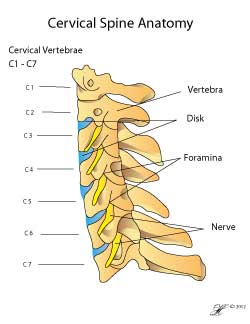
Diagram of the Cervical Spine (neck) showing normal anatomy
Neck pain is a common complaint and most causes of neck pain are not serious.
The support structures in the neck are made up of vertebrae (block-shaped bones) and ligaments (thick bands) that support the neck and allow it to move and carry the weight of the head. Because the neck is relatively less protected than the rest of the spine, it is more vulnerable to injuries that will lead to pain and restricted movements.
For some, neck pain will be a temporary issue and it will resolve with time. For others it can be a debilitating problem and require treatment.
Symptoms
You should consult a doctor for neck pain if:
- The pain occurs after an injury or blow to the head.
- Fever or headache accompanies the neck pain.
- A stiff neck prevents you from touching your chin to your chest
- The pain shoots down one arm.
- There is tingling, numbness or weakness in your arms or hands.
- The neck symptoms are associated with leg weakness or loss of coordination in arms or legs.
- The pain does not respond to over-the-counter pain medication (panadol etc.).
- The pain does not improve after a week.
Causes
Neck pain may be caused by:
- Disc degeneration.
- Narrowing of the spinal canal from bone spurs or herniated discs.
- Arthritis of the neck bones (cervical spondylosis) causing disc herniation or bone spurs to form.
- Poor posture.
- Sudden severe injury to the neck causing disc herniation, whiplash, blood vessel destruction and vertebral injury.
- In rare cases – cancer or meningitis.
Risk Factors
Investigations
Diagnosis is made by a doctor based on your history, symptoms, a physical examination, and results of diagnostic studies, if necessary. Some patients may be treated conservatively and then undergo imaging studies if medication and physical therapy are ineffective. These tests may include:
- Computed Tomography Scan (CT or CAT scan)
- Discography
- Electromyography (EMG)
- Nerve Conduction Studies (NCS)
- Magnetic Resonance Imaging (MRI)
- Myleogram
- Selective Nerve Root Block
- X-rays
Complications
Treatment
Seeking Advice
Your Family Doctor (GP)
Your Family Doctor will be able to diagnose and help treat your problem. He or she will be able to
- tell you about your problem
- advise you of the best treatment methods
- prescribe you medications
- and if necessary, refer you to Specialists (Consultants) for further treatment
